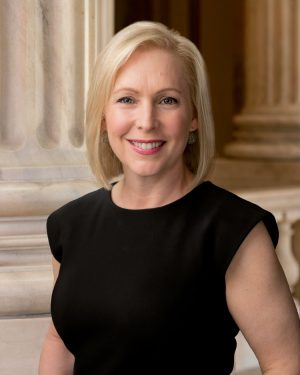Senator Gillibrand Discusses Senior Issues in White Plains

Health care and taxes dominated the discussion last week as US Sen. Kirsten Gillibrand hosted a town hall focused on seniors’ issues at the Little Theater in the Westchester County Center in White Plains on Oct. 10.
“Town halls are one of the most important things I can do as a senator because it is a way I can directly hear from my constituents,” Gillibrand said last week.
One of the top concerns expressed by state residents has been the federal tax law that was changed last year to limit the federal deduction to $10,000 for state and local taxes, Gillibrand said. The change in the SALT deduction last year has resulted in families losing their homes, she said.
Another important concern expressed by residents, particularly among seniors, has been medical expenses, Gillibrand said. “Unfortunately, drug companies keep price gouging.”
Gillibrand said her legislation, “The Stop Price Gouging Act,” would allow the federal government to sue pharmaceutical companies when they raise their costs without a reason. If “Medicare for All” was approved the federal government would negotiate with the drug companies to lower prices, she said. “If the pharmaceutical companies will not agree to lower their prices, the National Institutes of Health could create some prescription drugs and sell them to the public.”
Though Gillibrand received a generally positive reception at last week’s event from residents, White Plains resident Victoria Nicalov expressed strong concerns about Medicare for All. If more people received Medicare “it will go broke a lot faster,” she said, adding services for seniors will have to be cut. “Medicare is supposed to be for the seniors,” she said, adding there should be alternatives sought to cut health care costs such as setting cooperatives where doctors would provide services for a patient for one price such as $50 for the month. Do not take away private health insurance, she said.
“I believe that health care is a right and not a privilege,” Gillibrand replied. “I believe that Medicare works because it is the lowest cost and it is not for profit.”
Under her Medicare for All, non-seniors would buy into the federal program. To buy in, a worker would pay about four or five percent of their income and that would be matched by their employers and would be paid for throughout a working lifetime. “Everyone buys in. It’s not mandatory, it’s a choice. Doing so would create competition with the private sector and would put more money into Medicare, Gillibrand said.
Gillibrand said she wanted seniors and those with disabilities to “age in place” and continue to live in their communities. She is working on legislation that would expand Social Security by increasing the size of Social Security disability benefit payments to about $1,500 per month and also provide the benefit to the caregivers. “Those full-time family members who have given up their careers, given up their salaries because they must take care of a loved one full time, I believe they should also be eligible,” Gillibrand said.
Gillibrand said the cost of living, including medication, transportation and food, is too high for many seniors on fixed incomes in Westchester. She is working to reduce drug prices and work on ways to provide more access to local transportation and seeking to make sure “you’re not taken advantage of,” Gillibrand told the seniors.
Hearings have been held by the Senate Aging Committee on “how often our seniors are targeted by fraudulent criminals who are trying to take away money,” she said. One of the schemes is when swindlers claim the IRS is seeking unpaid taxes to frighten seniors. Gillibrand noted that her aunt was scammed out of $5,000 as the result of a tax scheme. Another scheme is frauds posing as grandchildren to extort money.
A woman named Sarah, who did not provide her last name, said she went to Washington in March to discuss legislation regarding Alzheimer’s disease. Sarah said her father passed away earlier this year. She wanted Gillibrand to support legislation to provide assistance for those with early onset Alzheimer’s and their caregivers. “I’m begging you to please sign,” she said while crying. “I’m begging for your assistance.”
Gillibrand said, “it sounds like I bill I could support.” Gillibrand also said she wanted to help seniors with Alzheimer’s to stay in their homes. She is supporting legislation that would allow Medicaid money to be used for home care for those with Alzheimer’s as an alternative to institutionalized care. “My grandmother, when she was quite ill, wanted to stay home,” Gillibrand said, adding the salaries of home health care workers needed to be significantly increased from the minimum wage.
